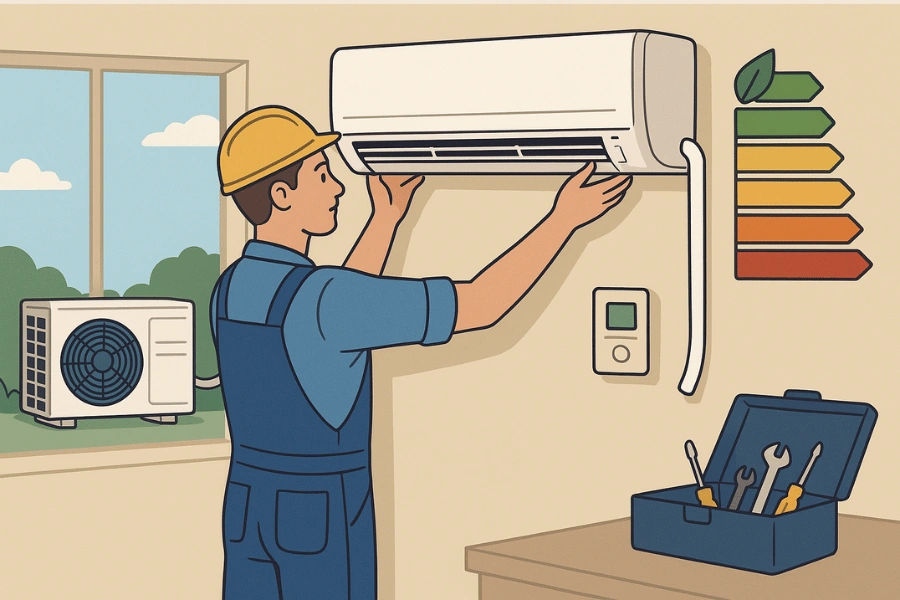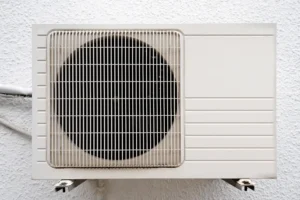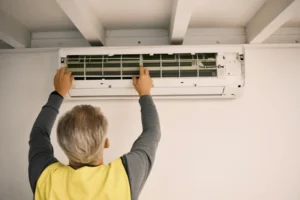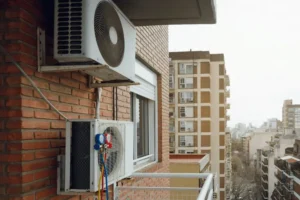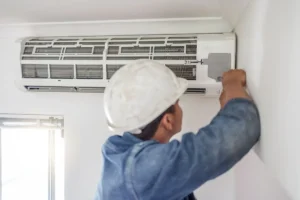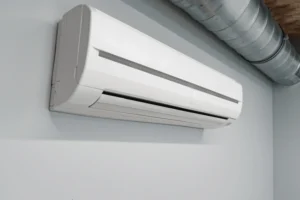Introduction: Why Energy Efficiency Matters in Ottawa
Ottawa is one of the coldest capital cities in the world, with winters that often dip below –20 °C and summers that reach well above 30 °C with humidity. For homeowners, this means heating and cooling systems must be powerful enough to handle extreme temperatures while remaining affordable to operate.
Ductless heat pumps, also called mini-splits, have become one of the most popular solutions for balancing energy efficiency with year-round comfort. But choosing and installing these systems in Ottawa requires careful consideration of efficiency metrics, technology, and design. A poorly selected or installed system may run inefficiently, leading to higher hydro bills and reduced comfort.
This article explores the key energy efficiency considerations for ductless heat pump installation in Ottawa, from technology features to installation practices and long-term maintenance.

Key Efficiency Metrics Explained
When evaluating a ductless heat pump, understanding energy efficiency ratings is the first step.
- SEER (Seasonal Energy Efficiency Ratio):
Measures cooling efficiency. A higher SEER means lower energy consumption during summer cooling. In Ottawa, a SEER rating above 18 is ideal. - HSPF (Heating Seasonal Performance Factor):
Measures heating efficiency. Since Ottawa has long winters, homeowners should look for units with HSPF ratings above 10 for strong energy savings. - COP (Coefficient of Performance):
Expresses how much heat a pump produces compared to the electricity consumed. For example, a COP of 3.0 means the system produces three units of heat per unit of electricity. - Energy Star Certification:
Ensures the unit meets government-backed efficiency benchmarks, which also makes it eligible for rebates.
| Efficiency Metric | Good Performance | Best-in-Class for Ottawa |
| SEER | 16–18+ | 20–33+ |
| HSPF | 9–10 | 11–13+ |
| COP (heating) | 2.5–3.0 | 3.5–4.0+ |
Cold-Climate Considerations
Ottawa’s climate poses unique challenges. Not every ductless heat pump performs efficiently when temperatures fall below –20 °C.
- Cold-Climate Models: Brands like Mitsubishi, Fujitsu, and Napoleon offer low-ambient or “Hyper-Heat” models that maintain heating capacity even at –25 °C to –30 °C.
- Defrost Cycles: During extreme cold, outdoor units accumulate frost and require defrost cycles, which briefly reduce efficiency. A properly sized and installed unit minimizes this impact.
- Backup Heat Sources: For homes with poor insulation, contractors may recommend a secondary heating system to supplement ductless heat pumps during extreme cold snaps.
Installation Practices That Impact Efficiency
Even the most efficient heat pump can underperform if it is poorly installed. Ottawa homeowners should pay attention to these factors:
- Correct Sizing (Load Calculation):
An oversized unit short-cycles and wastes energy, while an undersized unit struggles in peak winter or summer. Contractors use Manual J calculations to size systems accurately. - Indoor Unit Placement:
Wall-mounted or ceiling cassettes should be positioned for even airflow. Poor placement leads to hot and cold spots, reducing efficiency. - Outdoor Unit Placement:
Installers should avoid locations prone to snow drifts, ice buildup, or blocked airflow. Ideally, units are mounted on brackets above the snow line. - Zoning Strategy:
One of the biggest advantages of ductless heat pumps is zone heating/cooling. By heating only occupied rooms, homeowners reduce wasted energy.
Energy Savings Potential in Ottawa
Energy-efficient ductless systems can significantly cut energy bills.
- A cold-climate ductless heat pump can reduce heating costs by 30–50% compared to baseboard heaters.
- Compared to oil or propane furnaces, savings can reach up to 60% annually.
- Hydro Ottawa estimates that switching to a high-efficiency ductless heat pump can save the average household CA$500–CA$1,200 per year.
Cost vs. Efficiency Trade-offs
While high-efficiency models come at a premium, long-term savings usually justify the upfront cost.
| System Type | Installed Cost (CA$) | Typical SEER | Typical HSPF | Annual Savings Potential |
| Standard ductless mini-split | 4,500 – 7,000 | 14–18 | 8–9 | 25–30% |
| Cold-climate ductless | 7,000 – 12,000 | 18–24 | 10–12 | 40–50% |
| Premium multi-zone | 10,000 – 15,000+ | 20–33 | 11–13 | 50%+ |
Insulation and Home Envelope Considerations
Energy efficiency is not just about the heat pump, it’s about the home itself.
- Insulation: Upgrading attic and wall insulation reduces heating demand, allowing the heat pump to operate more efficiently.
- Windows and Doors: Drafty windows can negate efficiency gains. Energy-efficient windows keep indoor comfort stable.
- Air Sealing: Small gaps in walls or around ducts can significantly increase energy use. A blower-door test identifies leaks.
Smart Features That Enhance Efficiency
Modern ductless heat pumps come with advanced technologies that boost efficiency in real-world conditions:
- Inverter Technology: Adjusts compressor speed instead of cycling on/off, reducing wasted energy.
- Wi-Fi Thermostats & Smart Controls: Allow homeowners to schedule heating/cooling and monitor usage remotely.
- Occupancy Sensors: Some models reduce output when rooms are unoccupied.
- Variable Refrigerant Flow (VRF): In multi-zone systems, VRF technology directs energy to where it’s needed most.
Rebates and Incentives in Ottawa
Government programs reward homeowners for choosing efficient ductless heat pumps:
- Canada Greener Homes Grant: Up to CA$5,000 rebate for eligible upgrades, including ductless heat pumps.
- Enbridge Home Efficiency Rebate Plus: Additional rebates for combined insulation and HVAC upgrades.
- Hydro Ottawa Incentives: Periodic rebates for Energy Star certified equipment.
These programs reduce the payback period of a new installation, making higher-efficiency systems more attractive.
Environmental Impact
Switching to ductless heat pumps isn’t only about lowering bills, it’s also about reducing environmental impact.
- Replacing oil or propane systems with heat pumps can reduce household greenhouse gas emissions by up to 40%.
- Ontario’s grid is powered largely by hydro and nuclear, meaning electricity has a lower carbon footprint compared to fossil fuels.
- Efficient systems help homeowners future-proof their properties against rising carbon taxes on fossil fuels.
Long-Term Maintenance for Efficiency
To preserve efficiency, routine maintenance is critical:
- Filter Cleaning: Every 1–2 months to prevent airflow restriction.
- Annual Professional Service: Checks refrigerant levels, coils, and defrost cycles.
- Snow & Ice Management: Clearing around outdoor units in winter to avoid airflow blockage.
- Product Registration: Many brands extend warranties when units are registered after installation.
A well-maintained ductless heat pump can last 15–20 years with consistent efficiency.
Real-World Examples
- A Kanata homeowner installed a Mitsubishi Hyper-Heat system for CA$11,000. Annual savings on hydro and gas bills reached nearly CA$1,200, with a payback of less than 10 years.
- In Orleans, a family replaced baseboard heaters with a Fujitsu ductless system. Their Hydro Ottawa bills dropped by 35% in the first year.
- A local contractor reported that multi-zone systems are increasingly popular in older Ottawa homes, where adding ductwork would be costly.
Practical Tips for Homeowners
- Always choose cold-climate certified models for Ottawa winters.
- Invest in proper insulation before or alongside installation.
- Compare rebates and apply early, funds can run out.
- Work with experienced Ottawa HVAC contractors familiar with local climate conditions.
- Plan for spring or fall installation to maximize contractor availability and efficiency testing.
FAQ
How does Ottawa’s winter season affect installation costs?
Ottawa’s harsh winters make installations more complex due to snow removal, frozen ground, and limited working hours. This often increases labor costs and may lead to scheduling delays compared to spring or fall installations.
Why are spring and fall ideal for installation?
Milder temperatures in spring and fall make installation easier and faster. Contractors also tend to be less busy, which often results in lower pricing, faster scheduling, and better system commissioning under moderate weather conditions.
Does extreme cold reduce ductless heat pump efficiency?
Yes, although cold-climate certified models are designed to perform at –25 °C or below, efficiency naturally decreases during extreme cold due to frost buildup and increased defrost cycles. Proper sizing and installation minimize this effect.
Are rebates seasonal in Ottawa?
Yes, rebate programs such as the Canada Greener Homes Grant or Enbridge incentives may run out of funding or close at certain times of the year. Homeowners should apply early to maximize savings and ensure eligibility.
Should I plan installations around seasons for better outcomes?
Absolutely. Planning installation during spring or fall allows homeowners to avoid winter labor challenges, summer peak demand, and potential emergency pricing. It also aligns well with seasonal rebate windows.
Final Thoughts
For Ottawa homeowners, prioritizing energy efficiency is essential when installing a ductless heat pump. With frigid winters often dropping below –20 °C and humid summers reaching over 30 °C, every element, from system selection to installation and ongoing maintenance, directly impacts both comfort and long-term energy savings. Choosing high-efficiency models with strong SEER and HSPF ratings, cold-climate certification, and properly sized units ensures optimal performance even during extreme temperatures. Additionally, improving home insulation, sealing air leaks, and correctly zoning rooms further enhances efficiency. Combined with available government rebates and local incentives, ductless heat pumps represent a cost-effective, environmentally friendly, and reliable solution for year-round comfort in Ottawa residences.
